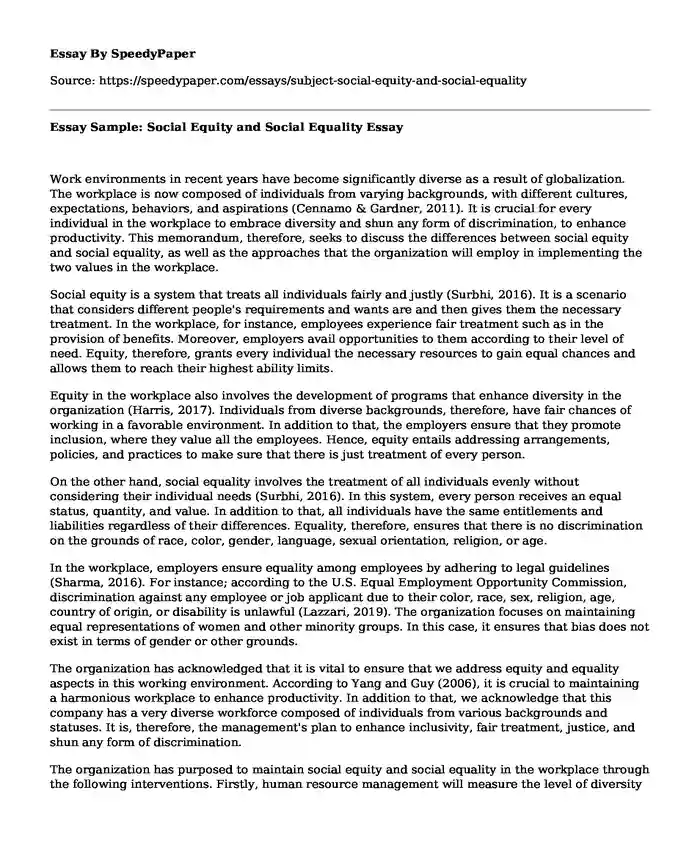
| Type of paper: | Essay |
| Categories: | Discrimination |
| Pages: | 3 |
| Wordcount: | 788 words |
Work environments in recent years have become significantly diverse as a result of globalization. The workplace is now composed of individuals from varying backgrounds, with different cultures, expectations, behaviors, and aspirations (Cennamo & Gardner, 2011). It is crucial for every individual in the workplace to embrace diversity and shun any form of discrimination, to enhance productivity. This memorandum, therefore, seeks to discuss the differences between social equity and social equality, as well as the approaches that the organization will employ in implementing the two values in the workplace.
Social equity is a system that treats all individuals fairly and justly (Surbhi, 2016). It is a scenario that considers different people's requirements and wants are and then gives them the necessary treatment. In the workplace, for instance, employees experience fair treatment such as in the provision of benefits. Moreover, employers avail opportunities to them according to their level of need. Equity, therefore, grants every individual the necessary resources to gain equal chances and allows them to reach their highest ability limits.
Equity in the workplace also involves the development of programs that enhance diversity in the organization (Harris, 2017). Individuals from diverse backgrounds, therefore, have fair chances of working in a favorable environment. In addition to that, the employers ensure that they promote inclusion, where they value all the employees. Hence, equity entails addressing arrangements, policies, and practices to make sure that there is just treatment of every person.
On the other hand, social equality involves the treatment of all individuals evenly without considering their individual needs (Surbhi, 2016). In this system, every person receives an equal status, quantity, and value. In addition to that, all individuals have the same entitlements and liabilities regardless of their differences. Equality, therefore, ensures that there is no discrimination on the grounds of race, color, gender, language, sexual orientation, religion, or age.
In the workplace, employers ensure equality among employees by adhering to legal guidelines (Sharma, 2016). For instance; according to the U.S. Equal Employment Opportunity Commission, discrimination against any employee or job applicant due to their color, race, sex, religion, age, country of origin, or disability is unlawful (Lazzari, 2019). The organization focuses on maintaining equal representations of women and other minority groups. In this case, it ensures that bias does not exist in terms of gender or other grounds.
The organization has acknowledged that it is vital to ensure that we address equity and equality aspects in this working environment. According to Yang and Guy (2006), it is crucial to maintaining a harmonious workplace to enhance productivity. In addition to that, we acknowledge that this company has a very diverse workforce composed of individuals from various backgrounds and statuses. It is, therefore, the management's plan to enhance inclusivity, fair treatment, justice, and shun any form of discrimination.
The organization has purposed to maintain social equity and social equality in the workplace through the following interventions. Firstly, human resource management will measure the level of diversity in the company's workforce. The process will involve evaluating every employee's profile to identify the different cultures, beliefs, perceptions, and statuses that may cause barriers in the workplace. Secondly, we will conduct a management systems' audit to discover any existing or potential prejudices against employees from a particular culture or group. The move will aid in eliminating discrimination against any individual. Thirdly, the organization will conduct diversity training for every employee. The training will equip every individual with knowledge about embracing, respecting, and appreciating their colleagues regardless of the cultural background or orientation. Finally, we will ensure that we reward every employee fairly and provide equal opportunities for all individuals to promote justice and fairness.
In conclusion, social equity and equality are vital aspects of every diverse working environment. Organizations should treat their employees fairly and also avail equal opportunities while considering their varied requirements. It is also essential to carry out cultural and management systems' audits to identify potential threats to inclusivity and fair treatment. Maintaining of equity and equality in the workplace, therefore, aids in promoting conducive working environments and improves productivity.
References
Cennamo, L., & Gardner, D. (2011). Generational differences in work values, outcomes, and person-organisation values fit. IEEE Engineering Management Review, 39(2), 24-36.
Harris, B. (2017). "Equity vs. Equality: Debunking the Corporate Myth of Meritocracy." The Inclusion Solution. Retrieved from http://www.theinclusionsolution.me/equity-vs-equality-debunking-corporate-myth-meritocracy/.
Lazzari, Z. (2019). "Definition of Equality in the Workplace." Chron. Retrieved from https://smallbusiness.chron.com/definition-equality-workplace-14653.html
Sharma, A. (2016). Managing diversity and equality in the workplace. Cogent Business & Management, 3(1), 1212682. Retrieved from https://www.tandfonline.com/doi/full/10.1080/23311975.2016.1212682?af=R.
Surbhi, S. (2016). "Difference Between Equity and Equality." Key Differences. Retrieved from https://keydifferences.com/difference-between-equity-and-equality.html
Yang, S. B., & Guy, M. E. (2006). GenXers versus boomers: Work motivators and management implications. Public Performance & Management Review, 29(3), 267-284.
Cite this page
Essay Sample: Social Equity and Social Equality. (2022, Nov 21). Retrieved from https://speedypaper.net/essays/subject-social-equity-and-social-equality
Request Removal
If you are the original author of this essay and no longer wish to have it published on the SpeedyPaper website, please click below to request its removal:
- Core Managerial Skills - Faculty of Law Admission Essay Sample
- Essay Example: Facebook and the Regulations in Politics
- Database and Network Security, Computer Science Essay Example
- Nursing Essay Outline Example: Treatment of Patients with Mental Health Problems
- Free Essay - Analyzing the Foreign Market Entry Strategy of Carrefour
- Free Essay: The Boundaries of Freedom
- Free Essay. Similarities and Differences Between Social Media and Social Marketing
Popular categories




